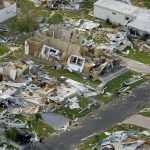In an astonishing turn of events that has left many shaking their heads, Joe Biden took nearly a week to finally authorize federal aid in response to Hurricane Helene, which wreaked havoc across western North Carolina. The ostensible leader of the free world, with his team of caretakers, has now decided to deploy an embarrassing 1,000 federal troops from Fort Bragg to assist with disaster relief, a whole 250 miles away. One can’t help but wonder if the delay was due to a fresh game of solitaire being played in the Oval Office.
The President’s big reveal included directing the Department of Defense to send in a motley crew from an Infantry Battalion Task Force, nestled nicely at Fort Liberty. This group, while certainly appreciated, appears more suited for a minor skirmish than the extensive disaster relief efforts truly needed. The soldiers, along with a glorified Forward Support Company armed with a few trucks and a limited support structure, seem to represent the epitome of limited federal military involvement in what is actually a catastrophic five-state disaster.
The Department of Defense described their response as “minimal,” which sounded like a generous subjective interpretation given the scope of the devastation. While certain teams were tasked with liaison duties and emergency inspections, the critical ground truth remains: helicopters are desperately needed to rescue stranded individuals and deliver supplies to areas cut off by deluge. Sadly, the military’s string of available aircraft pales in comparison to the number of civilian choppers buzzing around in the skies, making a mockery of the government’s efforts.
Adding to the absurdity, reports have emerged from the ground that volunteer efforts, especially from civilians, have been at the forefront of saving lives. Brave souls are using their helicopters, completely unfettered by bureaucratic nonsense, to reach those in dire need. These unsung heroes are finding people waving SOS flags in the mud and using their resources to rescue infants and the elderly. Unfortunately, the government seems too busy coordinating the paperwork to actually help those in crisis, leaving many to contend that the real lifelines come from private citizens rather than the military that should be on full display.
The underlying question here concerns the astonishing lack of urgency from the administration. After Governor Roy Cooper requested federal support, Biden’s response was sluggish, invoking the Stafford Act days later and sending a brigade combat team that seemed woefully outmatched for the task. With over 100 helicopters stationed at Fort Bragg, the fact that only a handful have been dispatched raises eyebrows and challenges the administration’s priorities and effectiveness. A hungry public is left pondering what it takes to mobilize real, immediate military assistance in times of crisis when they could be proactive instead of mired in red tape.
With nearly 200 lives reported lost and the death toll climbing, one might expect a more decisive response from the powers that be. Instead, the persistent sight of private rescues overshadowing any military efforts adds insult to injury. The clear conclusion is that when it comes to emergency management, political promises don’t save lives; action does. And right now, the bureaucracy’s slow crawl through disaster response could very well be costing lives worth saving.




